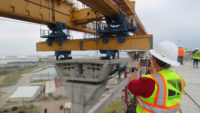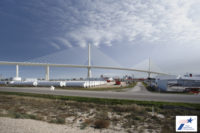Legal
Framework Forged to Resolve Corpus Christi Bridge Design Dispute

TxDOT ordered a halt on the New Harbor Bridge's main span in July over design concerns, but the agency says it has reached an agreement with its contractors to resolve the issues.
Photo courtesy of New Harbor Bridge Project
The Flatiron/Dragados LLC joint venture responsible for design and construction of the New Harbor Bridge Project in Corpus Christi, Texas, has reached an agreement with state transportation officials aimed at resolving safety issues identified in the design of the troubled $930-million project. The Oct. 6 agreement between FDLLC and the Texas Dept. of Transportation identifies the joint venture's responsibilities to address “highly problematic” concerns, which led to a mid-July shutdown of construction on the 1,661-ft-long bridge’s cable-stayed main span. A month later, TxDOT issued a notice of default threatening to remove FDLLC unless the concerns were resolved.
A report to the agency by independent consultant International Bridge Technology suggested that FDLLC’s planned design put the bridge at risk of collapse under certain conditions. The IBT review indicated design defects with the span's delta frames and their connections to adjacent precast box units. IBT also found inadequate capacity of the pylons. And it raised concerns that deficiencies in footing caps could collapse under certain load conditions.
“Significant” uplift at intermediate piers and “excessive torsion and other stresses related to crane placement during construction” were also of concern, said a letter from TxDOT to the joint venture, released in August.
A New Direction
Announced following several weeks of discussions, characterized by TxDOT officials as representing “a new direction” in FDLLC’s position, the agreement establishes what the agency calls “the legal framework for resolving the safety issues” identified in IBT’s reports, and “affirms FDLLC’s responsibility to complete this work at FDLLC’s expense and to TxDOT’s satisfaction.” Until then, the agency added, the notice of default will remain in place.
In addition to the design work, FDLLC is responsible for securing needed government and environmental approvals, and any additional property acquisition. While the joint venture is also responsible for related delays and disruptions, TxDOT will extend the project’s completion deadlines for the durations necessary for the additional work to be completed. The agency will also not assess liquidated damages in connection with the additional work provided that it is “timely completed” in accordance with a mutually agreed upon schedule.
The agreement also calls for TxDOT and FDLLC to set a deadline for reaching a formal settlement agreement resolving all of their disputes.
More Progress Needed
According to an agency statement, “there is still progress that needs to occur between TxDOT and FDLLC ... to finalize and approve the design changes required to address the safety issues identified by TxDOT and allow for an updated schedule to complete the project.” Prior to the mid-July construction pause, FDLLC had estimated the bridge would be completed in late 2024.
The same day the agreement was announced, Marc Williams, TxDOT's executive director, told a state legislative hearing that the agency retains the option to remove FDLLC without further notice, and has taken preemptive steps to continue construction should that occur.
“TxDOT understands and very much shares in the frustration that the residents and businesses of the Corpus Christi region have felt over the delays associated with the work on this project,” Williams said in his opening remarks at the hearing. “Our commitment remains to see this project through to completion in a manner that is safe, responsible, and expedited, and to quickly provide the region with an updated schedule as soon as the design changes are approved.”
Representatives of FDLLC confirmed the joint venture "is working with TxDOT to remediate concerns and continue with construction" on the project, but otherwise deferred to TxDOT.



